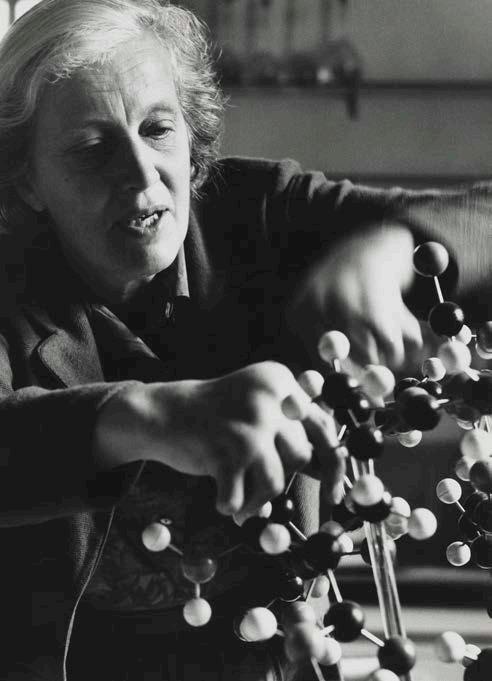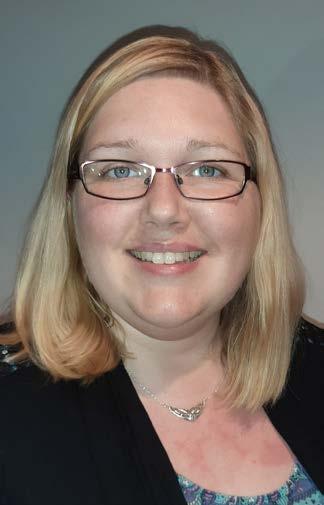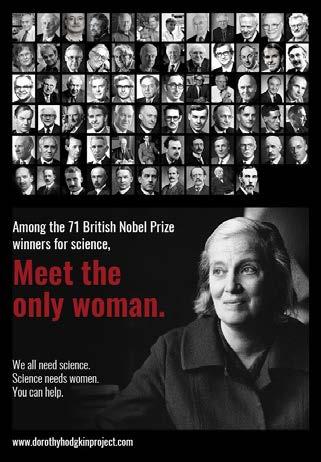
4 minute read
The Dorothy Hodgkin Fellowship
A BOND ACROSS GENERATIONS The Dorothy Hodgkin Fellowship
Despite trailblazing pioneers and concerted activism, women scientists are still underrepresented in academia and industry. In 2020, however, our new Dorothy Hodgkin Fellowship will add another voice to those advocating for innovation and opportunity.
Advertisement
It is a sad fact that, today, women represent only 30% of researchers globally, a little over 10% of senior research roles in Europe and just 3% of Nobel Prize recipients. At a time when we’re struggling to overcome multiple existential threats from coronavirus to climate change, such inequality is not only unjust, but abysmally wasteful of the talent which is out there.
Fortunately, Somerville’s long tradition of equality will seek to challenge that state of affairs through our new Dorothy Hodgkin Fellowship. The Fellowship embodies our admiration not only for Dorothy Crowfoot Hodgkin’s intellectual brilliance – she is the only British woman ever to have been awarded a Nobel Prize in science – but also the way in which she unerringly embodied Somerville’s ethos of creating new opportunities and pathways for women. Somerville witnessed Dorothy Hodgkin’s brilliance at firsthand throughout her career. We supported and nurtured her studies as an undergraduate, funded a final year at Cambridge and created a new position for her back at Somerville. For many years, while she continued the work in x-ray crystallography that would win her the Nobel, her Fellowship at Somerville was her only salaried position.
Dorothy Hodgkin was also the first woman at Oxford to receive any form of maternity pay, and she went on to fight for similar support for women in her lab. Hodgkin saw a clear need for childcare within the College, and gave part of her Nobel Prize winnings to help set up the Somerville Nursery. Today, we remain one of only a handful of colleges to offer this provision.
Inspired by Dorothy Hodgkin, Somerville chose to mark the 50th anniversary of her Nobel win in 2014 by establishing a scholarship to support women in science – and accompanying it with an ambitious crowdfunding campaign. The idea was met with rousing support from our wonderful alumni, who helped us raise £382,000 in support of a five-year Dorothy Hodgkin Career Development Fellowship for an outstanding early-career research scientist.
We are thrilled to announce, therefore, that Dr Fay Probert will be the inaugural Dorothy Hodgkin Fellow for the year 2020-21.
Like Hodgkin, Dr Probert’s research is fundamentally interdisciplinary. She started out studying Maths at Warwick, but followed this with an MSc in Mathematical Biology and Biophysical Chemistry then a PhD in Analytical Chemical Biology. Today, she uses a combination of analytical chemistry, mathematics, and biology to understand how chemical pathways in the body are perturbed by disease.
Fay’s particular interest is in understanding the chemical processes that are associated with inflammation in the brain, with the aim of developing novel diagnostic tests and improving the treatment of autoimmune diseases of the central nervous system, such as multiple sclerosis. ‘My hope is that, in the not-too-distant future, I will be able to generate and interpret a more detailed map of an individual’s metabolic processes to enable personalised medicine and better management of autoimmune disease,’ says Fay. Fay is also an innovator, pushing back boundaries at the intersection of tech and science. She joined Somerville as a JRF in 2018, and is now developing a new app with fellow Somervillians Abi Yates and Tianrong Yeo that will allow clinicians and patients with rare autoimmune diseases to manage those conditions.
Of her appointment, Fay commented that: “I am extremely honoured to have been awarded a Fellowship named after Dorothy Hodgkin, especially because this represents a unique opportunity to develop my own independent group within the supportive environment of the Chemistry Department. Such fellowships are extremely rare, yet play an essential support role for researchers who require flexible working hours, whether due to caring responsibilities or illness.
“I was particularly attracted to this opportunity both because of its emphasis on interdisciplinary research and its close ties with Somerville, where I already have many collaborators and friends. I am extremely proud to be a member of the Somerville family and look forward to continuing to contribute to the intellectual environment in the College and taking part in outreach activities, particularly encouraging women in STEM.”

Somerville is delighted to honour Dorothy Hodgkin’s legacy by welcoming Fay to this exciting role, and we remain deeply grateful to all those whose support made this Scholarship a reality.

We were delighted to support this initiative, which will support early career innovators in a fitting tribute both to Dorothy Hodgkin’s pioneering methods to identify the structures of molecules and her support for scientists who face barriers in pursuing their research.
Sybella Stanley (1979, Ancient and Modern History) and Paul Zisman










